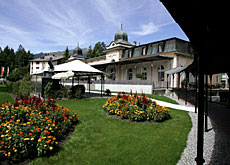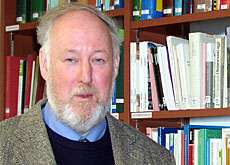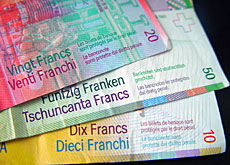Romansh row inspires strong language

Parliament’s decision to hold its 2006 autumn session in the Romansh-speaking part of Switzerland has catapulted the lesser-known fourth national language into the limelight.
But guardians of Romansh say they want more than a “symbolic gesture” and have repeated calls for the language to be legally protected.
The parliamentary session will take place in the town of Flims, which sits on the language border between Romansh and Swiss-German. The town has even brushed off its Romansh name, Flem, for the occasion.
There are practical reasons for holding the session in eastern Switzerland since the parliament building in Bern will be undergoing reconstruction.
But members of parliament say they are keen to use the opportunity to focus on Switzerland’s smallest linguistic community, which numbers 35,000, and the problems of a mountain region.
Clà Riatsch, professor of Romansh literature at the University of Zurich, however, is unimpressed.
“This is just a gratuitous symbolic gesture,” he said. “Instead of dealing seriously with the issue of multilingualism in Switzerland, they will say a lot of nice things but they don’t ring true.
“They would do better to hold a serious discussion about the law on languages, which the government has put on ice.”
Legislation shelved
In April the government decided to shelve legislation aimed at protecting Switzerland’s four national languages – German, French, Italian and Romansh.
Ministers said they could not afford the SFr17 million ($13.6 million) needed to implement measures set out in the draft law.
The decision has not escaped the attention of the Council of Europe, which has made its feelings known to the government.
In its recommendations to Switzerland on implementing the European Charter for Regional and Minority Languages, it called for the adoption of a law as soon as possible to implement the first and third paragraphs of Article 70 of the Swiss Constitution.
This stipulates that Romansh should be an official language of the Confederation in its dealings with Romansh speakers and used in promoting exchanges between the various language communities.
The Council of Europe also wants to see increased use of Romansh in the courts and by the local authorities.
But Riatsch is against imposing a cultural policy on the people, saying bureaucrats would do better to concentrate on the real needs of Romansh speakers.
Money talks
This year the Swiss government has given the authorities in Graubünden SFr4.5 million ($3.56 million) to maintain Romansh and Italian. The canton, which is predominantly German-speaking, has topped this up with a further SFr2.5 million.
The lion’s share of the money is being spent on Romansh, which has five regional dialects.
But attempts to establish a lingua franca called “Rumantsch Grischun” for use by the cantonal authorities have yet to become widely accepted.
“The Romansh-speakers are bilingual. In everyday life they regularly use Swiss-German as well, and, to varying degrees, everyone knows High German,” said Riatsch.
“In a court they can certainly use German. I don’t believe in a policy that calls for Romansh to be used everywhere, regardless of the cost.
“Issuing military regulations in Rumantsch Grischun is no use to anyone. The money they spent on the translation was completely wasted.”
Shared view
This view is shared by Constantin Pitsch, head of the service for linguistic and cultural communities at the Federal Culture Office.
“The state cannot and must not impose use of a language but should guarantee the possibility of using it for those who wish to do so,” he said.
One move that has been welcomed is the recent decision by the Swiss Broadcasting Corporation to expand its Romansh service.
The annual budget was increased by ten per cent to SFr22 million, at a time when broadcasters in the other national languages are being asked to cut costs.
“The impact of radio and television on Romansh is huge,” acknowledged Riatsch. “It has contributed to interregional understanding. Today, a speaker of the Sursilvan dialect can understand someone from the Engadine. That wasn’t the case 30 years ago.”
Radio broadcasts in Romansh commenced as early as 1926, while TV programmes were added in 1963.
Today, there are radio broadcasts 14 hours a day. Thanks to the new funding, “Telesguard”, the Romansh news programme, will increase from six to ten minutes a day.
swissinfo, Doris Lucini
The 2004 budget for canton Graubünden includes SFr7 million for promoting Romansh and Italian.
SFr4.5 million of this comes from the federal government.
Around SFr3 million will go to the linguistic organisation, Lia Rumantscha.
SFr1.8 million is earmarked for publishing and the Romansh press agency.
Romansh is derived from Latin, and is Switzerland’s fourth national language.
“Romansh” is actually a generic term used to indicate the five dialects spoken in canton Graubünden (Sursilvan, Vallader, Surmiran, Sutsilvan and Puter).
“Rumantsch grischun” was created in 1982, with the aim of providing Romansh speakers and the cantonal authorities with a standard written language.
According to the 2000 census, Romansh speakers account for 0.46% of the population. 35,000 people claim to speak Romansh as their first language.

In compliance with the JTI standards
More: SWI swissinfo.ch certified by the Journalism Trust Initiative


You can find an overview of ongoing debates with our journalists here. Please join us!
If you want to start a conversation about a topic raised in this article or want to report factual errors, email us at english@swissinfo.ch.